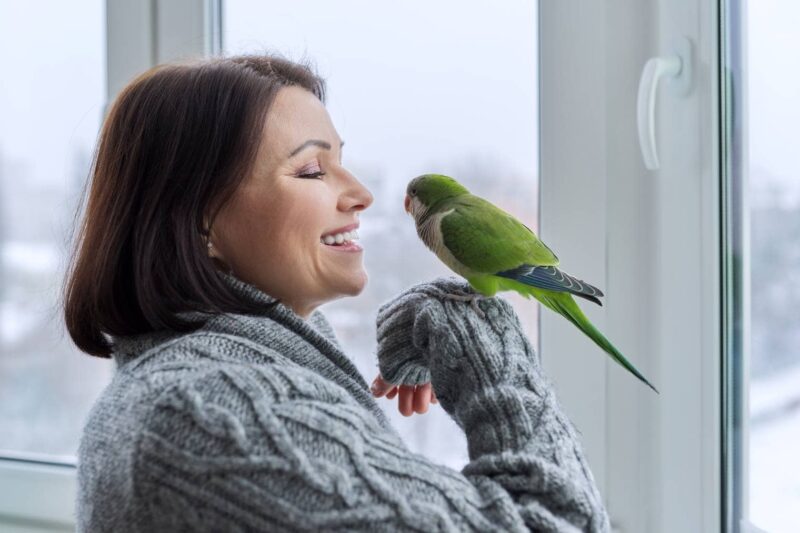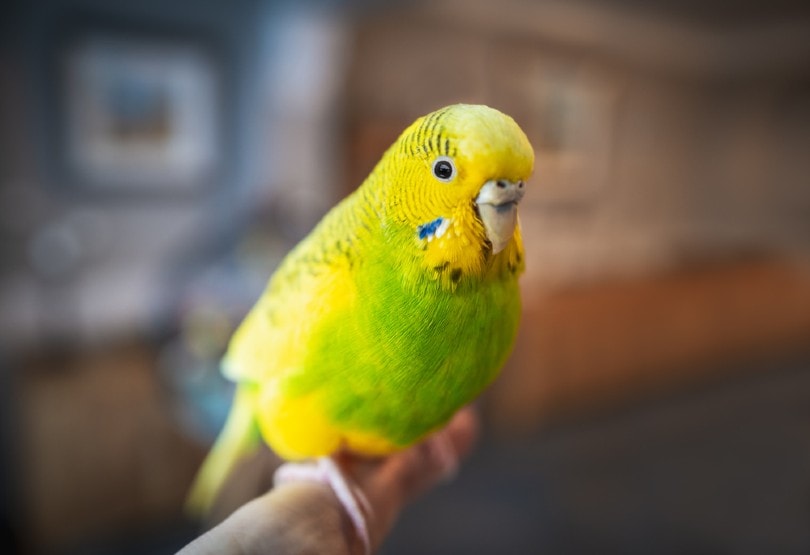Can Parrots Eat Fish? Vet Reviewed Health Concerns
By Jordyn Alger
Updated on

This article has been reviewed by a qualified veterinarian using information available at the time of review. It should not be construed as veterinary advice tailored to your bird. Bird owners are urged to consult with their veterinarian when making dietary decisions for their pet.
Parrots are remarkable pets and complex creatures. If you’re a new bird owner, you may be experiencing first-hand just how amazing yet complicated parrots are—especially when it comes to feeding them. You’ve been trying your best to feed your pet a healthy, nutritionally balanced diet, but it can be complicated. For instance, can parrots eat fish? In short, the answer is yes because fish is not toxic to them.
However, the long answer to this question is more complex. Given that there are around 400 species of parrot, it’s hard to give a one-size-fits-all answer. Technically, fish are not toxic to parrots, so it can be a safe snack when given in moderation. However, not all fish dishes are appropriate for parrots, and some species of parrot tolerate protein better than others. To learn more about which fish to feed your parrot, keep reading below but keep in mind your parrot is not missing out if you choose not to offer fish in their diet.
Health Concerns of Feeding Fish to a Parrot
As a very occasional treat, feeding fish to your parrot is usually perfectly fine. However, there are some health concerns that pet parents should be aware of.
First, parrots (and all pets, for that matter) thrive on a varied diet. Variety in your parrot’s meals provides a more nutritionally balanced diet, ensuring that they don’t lack essential vitamins and minerals. While fish can occasionally be a healthy addition, it should not make up the bulk of your pet’s diet. Instead, parrots should mainly be fed a species-appropriate balanced pellet diet. Excessive dietary protein can lead to gout, especially in older birds.
In addition, feeding your parrot fish that is uncooked, undercooked, or reheated may increase their chances of developing a bacterial infection. If you feed your parrot fish, it must be freshly cooked, not reheated in the microwave.
Finally, fish that is improperly prepared can be unhealthy for your parrot. Plain-cooked fish is the only appropriate way to feed fish to your pet. Therefore, you should avoid fish that has been fried, canned, seasoned, or prepared with butter or oil.

How Much Fish Should a Parrot Eat?
As mentioned, the bulk of your parrot’s diet should be a species-appropriate balanced pellet food. The pellet food should represent around 40–80% of your pet’s diet, depending on their species. Other additions are also species-based; however, all parrots will eat fruit and vegetables to some degree.
Therefore, the amount of fish that your parrot should eat is very minimal. Feeding your parrot a bite of plain-cooked fish every few weeks is a good guideline.
Can Parrots Eat Shellfish?
While fish can be a decent snack for your parrot, shellfish is not recommended. Shellfish can be toxic to birds, so it is best to avoid them altogether.

What to Do if Your Parrot Has Eaten Something They Shouldn’t
No matter how responsible or vigilant you are, accidents can always happen. If your parrot has eaten something they shouldn’t have, acting promptly is essential. Birds have sensitive systems, so the effects of toxicity may appear rapidly.
If you know that your bird has ingested something dangerous, the first step you should take is to contact your vet. Do not attempt to induce vomiting since it can cause physical trauma to your pet and only make the situation worse.
Your vet may ask you to check your parrot’s mouth to see if the food or substance is hiding under their tongue or in their cheek. You may be prompted to remove it delicately and carefully if it is. Otherwise, your vet may ask questions about the food consumed, your pet’s living conditions, diet, and lifestyle.
You must mention any health conditions your parrot has so your vet can make a more informed decision regarding your pet’s care. Likewise, if you have the label of the item consumed, show it to your vet.
The amount of food consumed typically determines how severe your pet’s condition is. Depending on how much they ate, your vet’s response may vary. Treatment may include fluid, medications, oxygen, and nutritional support.
Health Considerations for Various Parrot Species
Different species of parrots have different dietary requirements. Consult your vet to determine which diet is appropriate for your parrot’s species; in the meantime, read the list below to understand each species’ dietary needs better.
African Grey Parrot
African Grey Parrots require UVB rays to transform vitamin D into a usable form within the body. Without it, they will struggle to absorb calcium in their intestines. This species is prone to calcium deficiency.
Amazon Parrot
Obesity is a serious health concern for Amazon Parrots. Similarly, Amazon parrots are at risk of developing vitamin A and calcium deficiencies, so make sure that they receive adequate amounts of both in their diet.

Macaw Parrot
Macaw Parrots require more fat in their diets than most other species; thus, they should be given a higher quantity of nuts. They can still suffer from the effects of too much fat, such as obesity and atherosclerosis, so we recommend careful dietary planning.
Lovebirds
Lovebirds are vulnerable to calcium and vitamin A deficiency. Likewise, they are predisposed to egg-binding and other conditions caused by a lack of nutritional balance. To keep your Lovebird healthy, closely monitor their diet to ensure they receive a wholesome and balanced meal.
Final Thoughts
Caring for a pet parrot can be a challenge, but it is also a highly rewarding experience. Whether you are a first-time bird owner or an experienced caretaker, understanding the components of a healthy bird’s diet isn’t always intuitive. To ensure that you provide the best diet possible for your pet, consult your vet to learn more about their needs.
Featured Image Credit: vm2002, Shutterstock












